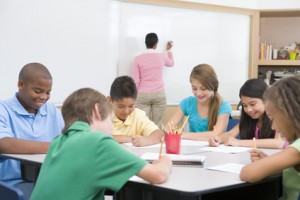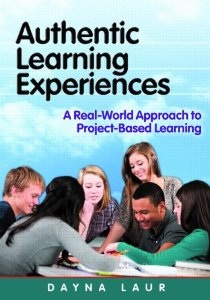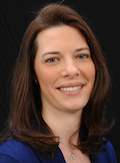Authentic Learning Experiences
by Dayna Laur
I frequently ask my fourth-grade daughter: “What did you learn in school today?” In response I often hear, “I don’t know” or “nothing much.” Disappointed, I long for the day when she tells me a spontaneous story about some exciting learning going on in her classroom—something so meaningful that even at nine years old, she and her classmates are making an impact on the world in which they live.
When I hear such stories, I will know that she is truly engaged in her own education. I will know she is mastering the critical content and skills that are needed to prepare her to be a producer of new information, rather than a mere consumer of search results in the age of the Google.
Classroom experiences for all students, at all grade levels, should turn into stories worth telling—stories that will be remembered long after their K-12 school years are behind them. As teachers, if we want students to experience this kind of memorable learning we have to shift the focus of our classroom environment from teacher-delivered instruction to one in which students participate in authentic learning experiences. Experiences that hook kids in, pique their curiosity, and motivate them to seek out new knowledge and skills on their own initiative.
This is the shift that I‘ve worked tirelessly to create for my own social studies students over the last several years. While it hasn’t been as easy as using lesson plans created by textbook companies or found online through generic lesson plan searches, it has been well worth the time and effort.
What is an Authentic Learning Experience?
Authentic learning experiences can be defined as challenging investigations linked to either a community or career connection. The challenging investigation requires students to solve a real-world problem or engage in tasks that are career focused and directly mirror the kind of interesting conundrums they might find in the professional world. In either instance, the open-ended nature of the investigation compels students to justify their work through deep research and testing methods.
These challenges are action-oriented in nature and leave the philosophical questions to be contextualized within the process of the challenging investigation. The final product, whether it is a proposal, a design, a presentation of learning or a new invention, is then created for an outside audience of experts in the field of study. These experiences are not, however, designed to be simulated activities in which students pretend to be engaged as participants in a mock event.

As these project based learning experiences are planned, they often become cross-curricular. For example, math, science or social studies teachers may form partnerships with English Language Arts teachers to produce the written components of these experiences or to involve students in reading non-fiction and literature that helps build foundational knowledge for the investigative process.
In Project Based Learning (PBL), students go through an extended process of inquiry in response to a complex question, problem, or challenge. Rigorous projects help students learn key academic content and practice 21st Century Skills such as collaboration, communication & critical thinking. ~ Buck Institute for Education
Why do it? Who does it?
The goal of the Authentic Learning Experience is to promote critical thinking by students. While the authenticity of the task itself creates a culture of engagement, the focus on critical thinking promotes a deeper understanding of core content and standards for learning.
These experiences are not reserved merely for our highest functioning students. Authentic Learning Experiences can and should be designed to meet the needs of all learners. In fact, the learning styles, educational requirements, and distinctive background experiences of each student involved will lead to a richer variety of ideas and proposed solutions to the challenging investigation. This strength-based learning approach benefits all kids.
In my 2013 book, Authentic Learning Experiences: A Real-World Approach to Project-Based Learning, I take readers through a variety of Authentic Learning Experiences that were shared with me as stories. These examples cover all grade levels and content areas. Each example is also aligned to the new Common Core standards with a detailed interdisciplinary focus on math, English, and writing.

• Then there’s the story of Mary Durand’s seventh and eighth grade math classes who obtained a Safe Routes to School planning grant, gained accolades from the Kansas Department of Transportation for their work, and helped spur improvements in road conditions around their school.
• In Fort Littleton CO, connected sixth grade students at Preston Middle School worked with teachers Amy Schmer and Tracey Winey to plan ways in which they could help decrease deforestation in the Philippines. Students were able to provide biomass stoves and training on their use to many families in Dumaguete in order to lessen the need for wood heated stoves.
I want these and other success stories found my book to inspire teachers to create opportunities that will allow their students to become eager learners and investigators with tales to tell about impacting lives and affecting change.
Please join me and the teachers showcased in Authentic Learning Experiences in transforming learning in the classroom from a passive endeavor to an exciting and meaningful activity that everyone is always talking about.
Dayna Laur is a National Board Certified Teacher and the author of Authentic Learning Experiences (Routledge/Eye on Education, 2013), a book about project-based learning. Dayna is a 14-year veteran of the social studies classroom and has taught a variety of grade levels and courses ranging from inclusion to Advanced Placement. She has implemented Authentic Learning Experiences in her own classroom and trains teachers both nationally and internationally on how to do the same. Dayna is also a member of the Senior National Faculty for the Buck Institute for Education and manages their online professional development system PBLU.



































